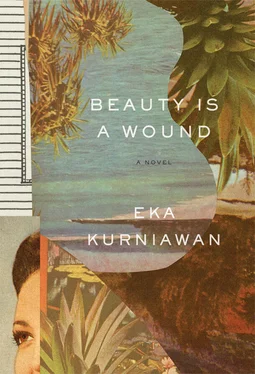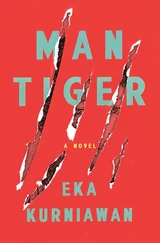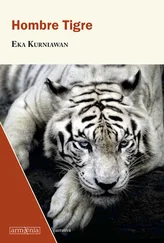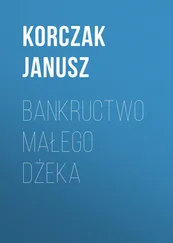That morning, after the troops and their trucks had gone and one thousand two hundred and thirty-two communist corpses had been buried in one mass grave, Kamino, who hadn’t slept but still looked full of energy, approached Farida, who’d been there for almost an entire week, and asked:
“My lady, would you like to come live with me and be my wife?”
Farida knew that it was her destiny to accept that man. So that morning, after they’d bathed and put on their finest clothes, they went to the village headman and asked to be married. They became husband and wife and went on their honeymoon to Farida’s old house.
This meant there was no gravedigger on duty that day, but that was no problem, because the army troops had grown tired of bringing all the communist corpses to the graveyard and having to help the gravedigger dig mass graves. After all, some of those communists had been killed by regular army troops but most of them had been killed by anti-communists — carrying machetes and swords and sickles and whatever else could be used to kill — who had left their corpses at the side of the road to rot. The city of Halimunda was now filled with corpses sprawled out in the irrigation channels and on the outskirts of the city, in the foothills and on the riverbanks, in the middle of bridges and under bushes. Most of them had been killed as they tried to escape.
Not everyone had been killed, however. Some had surrendered and had been thrown into local jails and the military prisons before being brought to Bloedenkamp, the delta’s most terrifying prison. Interrogations lasted for hours, ending with the promise that they’d be continued the following day. Some would die there, starved or beaten to death. Communists still on the loose were savagely hunted down, even deep into the jungle.
And Comrade Kliwon remained the most wanted man of all.
Shodancho formed a special unit to capture him, dead or alive.
Comrade Kliwon had in fact been sitting on the veranda with Adinda, patiently waiting for his newspapers, at the Communist Party headquarters when the special forces arrived. But swear to God, they didn’t see those two. They charged in and tore the place apart, ripping down the painting of Karl Marx and burning it on the side of the road along with the Party flag, the hammer and sickle, and all the books from the library, except for the books about silat , Indonesian martial arts, which Shodancho rescued for his own enjoyment. He’d led the attack himself, and he got two whole boxes of those silat books, which he immediately stashed in his jeep. All this happened right in front of Comrade Kliwon and Adinda’s eyes, who were in shock that nobody noticed them.
The troops went off to look in the public cemetery, because someone had reported he was hiding there, but it was abandoned — not even the gravedigger was there. Next they went swiftly to Mina’s house, following another tip, but she insisted throughout the long interrogation that she hadn’t seen Comrade Kliwon since the week before.
When the forces had gone, Mina said to herself, “That stupid kid should have known — all communists end up in front of a firing squad.”
A man hurried up to Shodancho, saying he’d seen Comrade Kliwon escaping out to sea with a young woman. In his growing annoyance and with his abiding and unsated desire for revenge, Shodancho ordered a search of the open sea. His soldiers chased Kliwon on motorboats, but all they found was an empty floating skiff tossing in the waves, without a trace of him. Hoping that they could find his corpse, Shodancho ordered three soldiers to go diving, but they came home deeply disappointed.
To vent his anger, Shodancho reinterrogated the few important Party men they’d been able to capture. Each man said that the last time he’d seen Comrade Kliwon he’d been sitting on the veranda waiting for his newspapers. Shodancho took their tale as a mocking joke and he brought those men out behind the military prison and executed each one with his very own pistol.
Rumors flew that Comrade Kliwon had mystical powers, that he could disguise himself as someone else, or split and multiply himself so that he could appear in many different places at once. But in the end, he was finally captured. Shodancho retraced his footsteps, led his troops back to the Party headquarters at the end of Jalan Belanda, and then suddenly he saw him, still sitting on the veranda with Shodancho’s own sister-in-law, exactly as the people he’d just executed had said. It was afternoon and a drizzly mist filled the city. Shodancho felt too embarrassed to ask where he’d been all day, because it seemed apparent, from the way Comrade Kliwon was sitting, that he had in fact been right there all along.
“You are captured, Comrade,” said Shodancho, “and my dear Adinda, you’d better go home.”
“What am I being arrested for?” asked Comrade Kliwon.
“Waiting for newspapers that will never come,” said Shodancho, with bitter humor.
Kliwon held out his hands and Shodancho handcuffed him.
“Shodancho,” said Adinda, standing there with tears streaming down her cheeks. “Allow me to say goodbye, because I’m afraid you’ll execute him as soon as he gets to prison.”
Shodancho nodded, and her farewell was simply a long kiss on Comrade Kliwon’s lips.
The news of his capture was quickly known and almost everyone in the city, some with their hands still caked with blood, quickly gathered and lined the street from the Communist Party headquarters to the military prison. Each person had special fond memories of Comrade Kliwon, and waited patiently for that man to pass by.
Comrade Kliwon had refused to climb up onto the military jeep, and walked with what remained of his dignity, escorted by soldiers. Adinda was in the jeep with Shodancho, moving very slowly behind that small procession, while the people crowded on the left and right sides of the street in a solemn silence. They looked with mixed emotions at the man who, even then, was still wearing his beloved cap. Many of the spectators had been his friends ever since their school days, and they wondered how it could be that the cleverest and handsomest man in the city had chosen to live as a misguided communist. Some were women who’d gone out with him, or had dreamed of going out with him, and they watched with teary eyes as if their one true love was leaving them.
The people’s anger vaporized as soon as they saw him. He walked straight and tall, still full of resolve, not at all like a conquered man. He walked like a commander certain he’d soon win the wars still yet to come. And the people who saw him remembered all the good he had done in the past, and forgot all the bad. He was a clever, smart, diligent, and polite young man, and suddenly no one remembered that he used to be a rabble-rouser who’d stiffed prostitutes, or that he had burned down ships.
On his cap there was now embroidered a small red star. He was wearing a shirt his mother had sewn for him, and slacks from his brief time studying in the capital, and borrowed leather shoes.
He turned his head hoping to catch a glimpse of Adinda, but he couldn’t see her inside the jeep. He also looked for Alamanda in the crowd, but she wasn’t there. Thinking that there wasn’t anyone of importance in the crowd, he walked calmly to the prison behind the military headquarters, where without a trial Shodancho pronounced that he was to be executed the next morning at five o’clock.
Adinda reappeared not long afterward and since visitors were forbidden, she just left one change of clothes that she asked Shodancho to pass on with a tray full of food.
“Promise me, Shodancho,” said Adinda, “that you make sure he eats it. Ever since he didn’t get his newspapers he hasn’t eaten anything.”
Читать дальше











